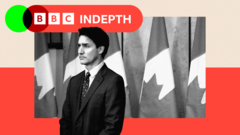The once affordable single-bedroom rental in Brampton, Ontario has become emblematic of a changing paradigm in Canadian housing. Priced at C$550 per month, this cramped space, tucked next to a sink and toilet, has ignited conversations about the dire accommodation crisis affecting Canadian families. Over the past three years, rents have spiked nearly 20%, leaving approximately 2.4 million households struggling with insufficient space and necessary repairs, as highlighted in a government watchdog report.
Despite traditionally being welcoming towards newcomers, a significant shift in the Canadian public mindset regarding immigration has emerged. A 2022 survey indicated that 27% of Canadians believed there were too many immigrants entering the country. By 2024, that number has surged to 58%. The combination of housing shortages exacerbated by rising inflation has sparked protests and the formation of campaign groups advocating for changes in immigration policy across cities like Ottawa and Vancouver.
Once considered a golden-era politician, Trudeau announced his resignation on January 6, 2024, amid plummeting approval ratings that reached a historic low of 22%. While immigration may not have caused his downfall, criticisms emerged that his administration failed to adequately address the growing public concern regarding rising prices and housing inequity. Increased immigration has played a role in Canada’s population growth, now exceeding 40 million, with immigration accounting for over 90% of this surge.
As the conservative party gains traction under the leadership of Pierre Poilievre, who proposes restricting immigration until housing supply meets demand, the cloud of Donald Trump's return to US politics looms larger. Trump's promises of mass deportations and strict border security could influence the Canadian immigration landscape, given the historic influx of asylum seekers during his first term.
The intertwined issues of immigration and housing have led to more intense public discussions. Protests calling for moratoriums on immigration are accompanied by sentiments of frustration that newcomer influx is disproportionally impacting housing and job markets. Advocates highlight systemic issues where the political sphere has neglected the housing crisis for decades, impacting both citizens and newcomers alike.
In response to rising discontent, Trudeau did announce a 20% reduction in immigration targets over three years, acknowledging the need for housing to keep pace with population growth. However, as Canada stands at this crossroads, the realignment of public opinion towards immigration management will play a fundamental role in shaping the policies of the next administration.
With such robust rhetoric against immigration and conservative opposition gaining steam, the future trajectory of Canadian immigration policies remains uncertain in a landscape vulnerable to pandemic impacts and shifting societal attitudes. The question looms: will Canada find its way back to its roots of acceptance, or will it follow the path of many nations grappling with the complexities of migration in turbulent times?
Despite traditionally being welcoming towards newcomers, a significant shift in the Canadian public mindset regarding immigration has emerged. A 2022 survey indicated that 27% of Canadians believed there were too many immigrants entering the country. By 2024, that number has surged to 58%. The combination of housing shortages exacerbated by rising inflation has sparked protests and the formation of campaign groups advocating for changes in immigration policy across cities like Ottawa and Vancouver.
Once considered a golden-era politician, Trudeau announced his resignation on January 6, 2024, amid plummeting approval ratings that reached a historic low of 22%. While immigration may not have caused his downfall, criticisms emerged that his administration failed to adequately address the growing public concern regarding rising prices and housing inequity. Increased immigration has played a role in Canada’s population growth, now exceeding 40 million, with immigration accounting for over 90% of this surge.
As the conservative party gains traction under the leadership of Pierre Poilievre, who proposes restricting immigration until housing supply meets demand, the cloud of Donald Trump's return to US politics looms larger. Trump's promises of mass deportations and strict border security could influence the Canadian immigration landscape, given the historic influx of asylum seekers during his first term.
The intertwined issues of immigration and housing have led to more intense public discussions. Protests calling for moratoriums on immigration are accompanied by sentiments of frustration that newcomer influx is disproportionally impacting housing and job markets. Advocates highlight systemic issues where the political sphere has neglected the housing crisis for decades, impacting both citizens and newcomers alike.
In response to rising discontent, Trudeau did announce a 20% reduction in immigration targets over three years, acknowledging the need for housing to keep pace with population growth. However, as Canada stands at this crossroads, the realignment of public opinion towards immigration management will play a fundamental role in shaping the policies of the next administration.
With such robust rhetoric against immigration and conservative opposition gaining steam, the future trajectory of Canadian immigration policies remains uncertain in a landscape vulnerable to pandemic impacts and shifting societal attitudes. The question looms: will Canada find its way back to its roots of acceptance, or will it follow the path of many nations grappling with the complexities of migration in turbulent times?






















